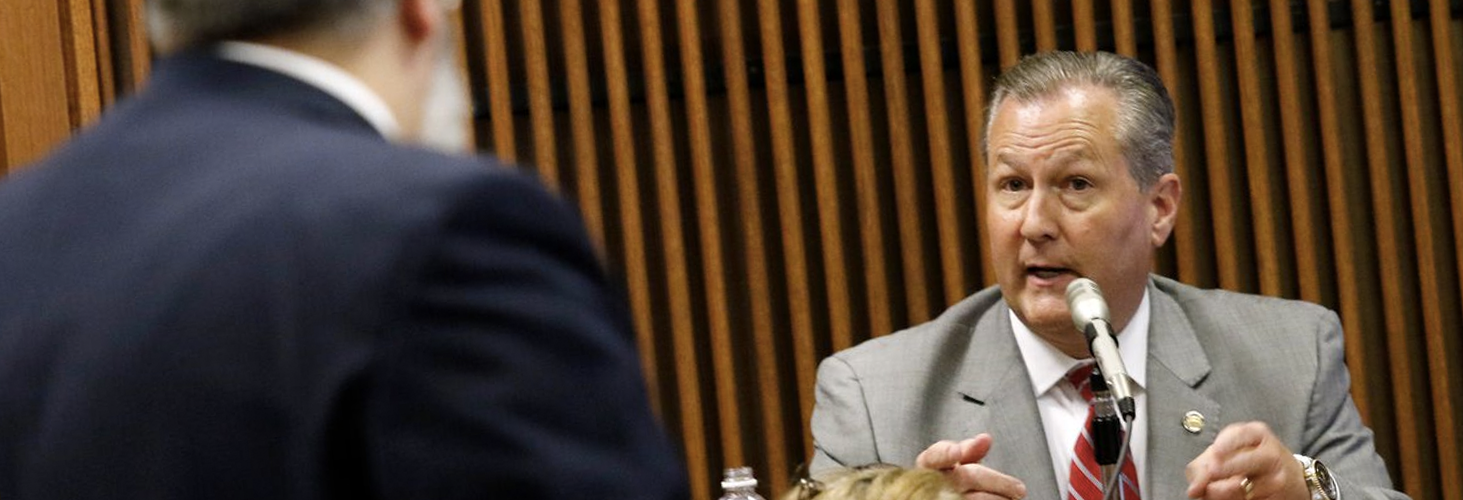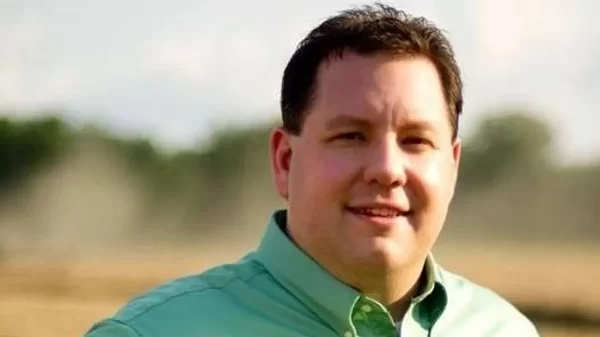By Bill Britt
Alabama Political Reporter
OPELIKA—In the matter of the State of Alabama v. Michael G. Hubbard, the defendant, during testimony on day eleven, sought to convince the jury that all of the charges against him were false. It was simply a matter of misunderstanding or misrepresenting the facts by the Prosecution.
Hubbard said that every investment in Craftmaster Printers was made by a friend. Then he added, that the investment by Sterns Agee, an agreement, was “a loan document.” They were not friends, even though the firm was given the same investment terms as everyone else.
In a stunning move, Hubbard declared that his long-time political ally, campaign manager and part of his “kitchen cabinet,” Dax Swatek lied to the jury when he said Hubbard asked him for an investment. The cooperating witness to Hubbard asking Swatek for the investment was BCA Chairman Billy Canary who seemed to have a lapse in memory when it came the meeting that he attended with Hubbard and Swatek.
Hubbard testified that all of his contracts were approved by the Ethics Commission, because they were all out-of-state, except for South Eastern Gas District (SEAGD), which had been pre-approved.
As for the 23 words added to the Medicaid portion of the General Fund Budget, that would have given his client, American Pharmacy Cooperative, Inc. (APCI), a monopoly over Medicaid Pharmacy Benefits, he said he didn’t know about the language, and had never read it. He said it had been placed in the budget by-then Rep. Greg Wren from the House Ways and Means Committee.
He also stated that at the meeting with John Ross and Chief of Staff Josh Blades, he told them he wasn’t worried about the language because his contract with APCI was only for out-of-state work.
He said he voted for the bill that contained the “monopoly” language, because he had already agreed to take it out in conference committee.
As for the various quid pro quo arrangements between he and former Governor Riley, in which he found Riley lobbying clients and passed legislation benefiting Riley’s clients, those were just cases of friends helping friends.
Hubbard ended his testimony with his attorney, David McKnight, asking if he had read the charges against him. He answered yes. McKnight asked, “Are you guilty of any of those charges?” Hubbard forcefully answered, “Absolutely not.”
Hubbard’s team had to believe it had gone out with a bang, because the defendant was calm, confident, and very elaborative in his testimony.
After the Defense finished, the Prosecution prepared for its cross. Hart asked for the jury to be excused. After they left, he informed Judge Jacob Walker, III, that Hubbard had earlier offered a proffer, and that because he had broken the proffer agreement, the prosecution would use it to impeach his testimony.
A “proffer or “queen for a day” letters are written agreements between federal prosecutors [in this case State] and individuals under criminal investigation, which permit these individuals to tell the government about their knowledge of crimes, with the supposed assurance that their words will not be used against them in any later proceedings. (The individuals can either be witnesses, subjects or targets of a federal investigation, although it is subjects and targets who provide most proffers).”
This means that at some earlier date, Hubbard met with the Prosecution and told his side of the story, with the caveat that his statements could not be used against him unless he changed his testimony at trial.
Judge Walker is allowing Hart to use the proffer to impeach Hubbard’s testimony.
Hart did not begin his cross with the proffer. We expect that to be part of today’s cross examination.
Hart began the cross by going over a number of emails in which Riley would ask Hubbard to do something for him, and Hubbard would immediately ask for something in return. Hubbard was very combative. When Hart asked a question about any of the arrangements between he and Riley, who Hart referred to as a lobbyist, Hubbard would answer, “You mean my friend?” After several contentious questions, Hart asked, “Bob Riley is your friend, yes or no? Bob Riley is a lobbyist, yes or no?” Hubbard agreed Riley was his friend, and grudgingly agreed he was a lobbyist. From that moment on, Hart continuously referred to Riley as “your friend and lobbyist, Bob Riley.”
Hubbard repeatedly refused to answer yes or no questions. Rather, he attempted to explain whatever Hart asked ,by changing the subject and giving extended answers. It became so tense that Judge Walker had to instruct Hubbard to answer with either a yes or a no, which Hubbard promptly ignored.
During the cross, Hart took Hubbard back through the chart which was used to show how much money Hubbard’s business interests were receiving every month, based in 2012, a period when he was crying poverty to anyone who would listen. This infuriated Hubbard, who blurted out, “You’re misleading,” and at other times saying, “You won’t let me explain.”
Hart was able to elicit testimony that outlined how Hubbard, who was making $60,000 per year as Speaker, with a family income worth $350,000, always wanted more money, and got it. Hart referred to it as the oldest motive: “Greed.”
In one of the more dramatic moments, when referring to Josh Blades, Hart said, “When that young man, who like the good angel, was sitting on your shoulder, told you, you should not vote for the budget, that would have given your client APCI a monopoly, you ignored him?” Hubbard said it was his budget, and it needed to pass because it was “for the people.” He didn’t recall that he ever said that it would raise “too many red flags,” as Blades testified.
Many in the Press Corp believe that Mike Hubbard’s “good day” was turned on its head by Matt Hart.























































